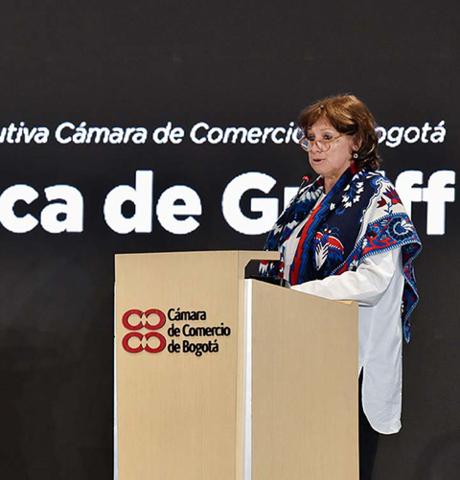The Chambers of Commerce are not moneymaking machines
Maria Isabel Rueda talks with Mónica de Greiff, president of the Chamber of Commerce of Bogotá.
In recent days the chambers of commerce have been pointed out as “very rich”. Particularly the obligation to renew the commercial registration of companies every year has been very criticized, which some consider a business. Is this not unnecessary?
No. This registry exists in many parts of the world, although is not always done by the chambers of commerce. Having it updated gives legal security to us all, starting with the entrepreneurs. This renewal must be done before March 31st, when some of the resources are collected, which following the law are invested in the entrepreneurs. The Chamber doesn’t keep any of these resources. In the case of the Chamber of Bogotá, we provide more than 985 services to entrepreneurs, from the smallest to the largest company, and they range from the creation of companies, to the formalization of the company in case they have been working without all the requirements until they can get to export.
How can we measure the influence of the Chamber of Commerce in the city?
The economic development of a city is in its businessmen/businesswoman. The chambers are development agencies working in the region, we help to achieve the right environment and we propose public policies to make the environment more friendly to make business to happen.
All these factors create a very important fabric. In Bogota´s case, 91% of the companies are micro-enterprises, these are very small companies, but still formalized. What allows them to be formalized? Among other factors, have access to banking, avoid the drop by drop and access to many public and private programs. The legality culture allows businesses to grow.
Can we say then that chambers of commerce are rich entities, but their wealth is invested in the well-being of the business community?
Yes. And with something that I would like to make very clear: We have surveillance of the Nations General Office of the Comptroller and the Superintendence of Industry and Commerce. It´s not like someone wakes up one day and says ‘let’s do something’ and it´s crazy, no. Everything works within a business frame, to ensure a strong and improved business environment. That’s why we participate in specific issues such as the security of Bogotá. We also conduct surveys to find out where to improve. We have just launched not long ago the Doing Business in Four Hours program, that has had an impact on the competitiveness of the country, not only in Bogotá.
By the way, what’s your view on the Mayor of Bogotá, who is making big judicial efforts to paralyze all main building projects of the city?
Let’s see. The Chamber of Commerce of Bogotá has always supported everything the mayor stands for, because although we are solving issues of impact such as mobility, we also contribute a lot in productivity, but we must also communicate how and when all these projects are executed.
But we are specifically talking of the judicial decisions that have stopped the TransMilenio going through the Seventh avenue and have also threaten to stop the metro…
The judges must understand it’s not advisable to dictate measures of suspension, but to give the administration the chance to explain itself. Many of these suspensions seem unsupported. At the same time, the Administration should hear more from the community. We’ve spoken on some occasions about the felling of trees, the air quality of the city, the objections that some people have on the Seventh avenue and the impact that this road will have on the National Park, or from the 94th street onwards but, in a city like Bogotá, where works are definitely required, citizens can not go to the judicial level for everything. We must find mechanism of agreement. And in this, the Chamber is an important agent.
How can the Chamber help refloat the city?
We do not defend a sector, this is the difference we have with a guild as such; the industrial, the merchants or the cattlemen; we defend all entrepreneurs as equal. We have always provided spaces of agreement where we expose and expose different points of view. For the new POT we have made many public hearings to understand what the community and the different stakeholders want about the use of land in the city and in the region.
There are many very expensive events sponsored by the Chamber of Commerce; Artbo, Bogotá Fashion Week and the Book Fair. Do Bogotans receive the benefit of what those investments imply?
Undoubtedly, yes. First, the bet on arts. An attractive city to invest in, must have several things: housing, transport, health, education and culture. These are priority elements for a company to be installed in a city. The are thousands of possibilities today, so a city must look for competitive advantages. And we are lucky to have both human talent and creativity for thousands of entrepreneurs to develop in the city.
Does all this have to do with the orange economy, which the President has been effusively promoting?
Of course. We are celebrating ARTBO’s 15th anniversary, we support art business through galleries, we support young artists and we have young artists exposing their projects in our buildings throughout all the year. This week end begins the ARTBO show, where there will be cultural routes throughout all the city.
And in terms of fashion?
In Bogotá there are more than 35 thousand companies dedicated to the entire textile chain, from clothing, design, jeweler to leather goods. They generate more than 150.000 jobs. Tell me, how can we not support them? It is one of the most dynamic sectors, but many of them have only a very small market niche. In the latest Bogotá Fashion Week, as never before, young designers sold and are now also exporting. In this occasion we brought buyers from Japan, France, Mexico among others.
As for the Book Fair, it bet attendance records this year. A person whom I respect a lot, the writer and columnist of the newspaper El Tiempo, Yolanda Reyes, recently wrote that the Book Fair doesn’t allow people to get interested in the fair, but rather there’s a more business approach than a more didactic and useful purpose. How can we correct this valid criticism?
I presented this column to Corferias on Thursday. I think it raises some very valid reflections. What do we want? What is the mission of the fair? Corferias, which is the entity that makes this fair, must reflect on these questions. We have to be aware that the commercial component of this fair is large. The Book fair is perhaps the most important for Corferias and the most beloved by the citizens. I think that the reflections that Yolanda Reyes raise are entirely valid. I would love to sit with her and hear what she imagines we should do, what is our role, because obviously we are not educators, but we have room to improve.
Do you share with Yolanda that the Book Fair should be smaller, more limited?
It’s the only thing I don’t share with her. What I would suggest is that the show could last longer, so that not everybody has to arrive on the same week end with 90.000 people hanging around, and like she says, there’s no space to walk. We can propose different routes, more time. We would have to reflect on it.
The Arbitration Center of the Chamber of Commerce has caught a lot of attention lately. What service is it providing to the city?
Arbitration and conciliation are alternative mechanisms of justice, and, many times, people believe that they are only used for very expensive cases. No, arbitration covers from the smallest dispute to the largest dispute. I would think we would have to promote it much more. Ordinary justice is covered, and there are these mechanisms that offer the guarantees and assurances to solve differences.
Reconciliation can be a very useful mechanism of justice in this country…
That’s right. We attend to many small processes, which are solved by this mechanism with an effectiveness of an 85%. It’s a mechanism that I invite to use and this way we can avoid judicializing issues that can be sorted this way. We also have a very important program called Hermes, a conflict resolution mechanism in schools.
How can Hermes help the conflicts in schools, a topic that’s really worrying?
We’ve had more than 450 thousand cases of bullying in public schools in Bogotá and the region. The project gives children tools to solve these conflicts. The are more than 153 public schools, and we have given a test program to the police in Chapinero and Socha, so that they can also facilitate tools that are not based on authority or fines, rather than in problem solving and coexistence in the community. Through dialogue and these tools, many conflicts without using violence can be solved.
Finally, the Ágora building has become a standard in the city. Did you send it to build or did you inherit it?
The board of directions had it created more than eight years ago. An international architectural contest had already been held. I inherited the designs and the great challenge of its construction. Corferias and Fontur are the principal partners. It’s still working today and there are events contracted until 2024. The Chamber has detected more than ten sectors of the economy that are turned on every time there’s an international congress, such as hotels, gastronomy, transport, translations, logistics etc. For every international participant who comes to the city for a three-day congress, they at least leave $452 in the city.
Do you believe that the Chamber of Commerce may be the leading factor for the orange economy that the President is so busily pursuing?
Yes; In fact, we are working with the Government in this objective, with our creative platforms and with the launch of an innovation center. I want to make clear that the chambers of commerce are not simply registration offices, we are regional development agencies where everything related to the environment must be brought together to do business in which the public, private and academic sectors are represented, where the services we offer allow them to be better and more competitive and have a longer life with successful entrepreneurs.
Source: El Tiempo


